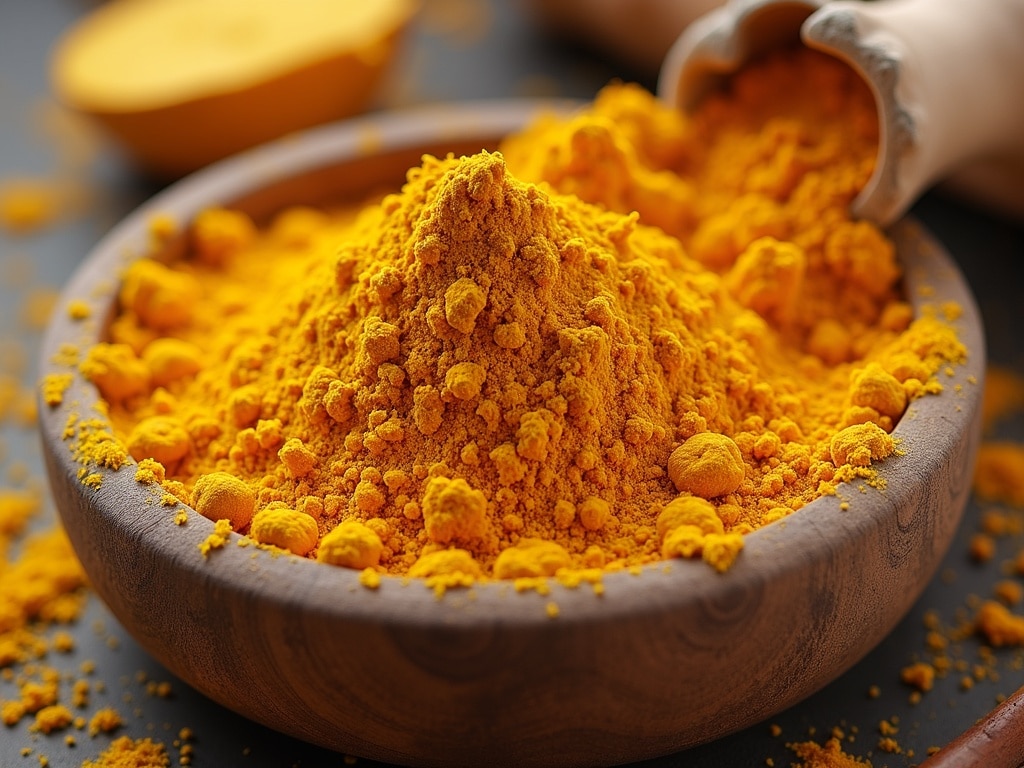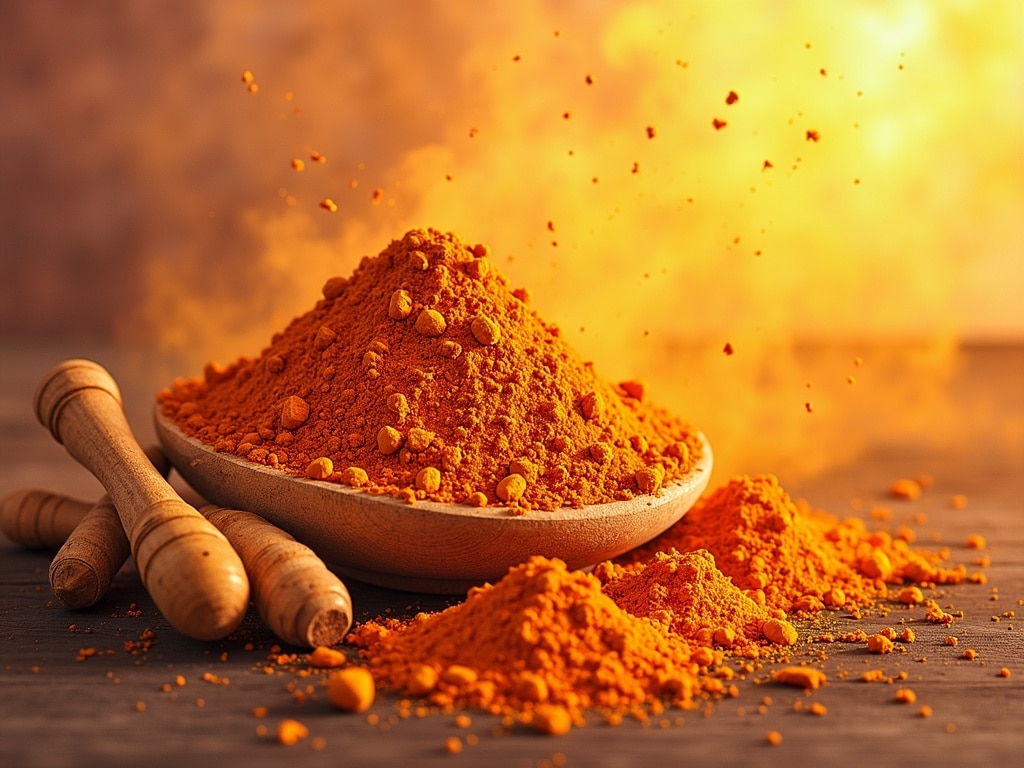Unlocking the Power of Turmeric and Curcumin: A Natural Approach to Inflammation Relief
Imagine a world where chronic pain and inflammation don't dictate your daily life. For centuries, ancient cultures have turned to the vibrant golden spice, turmeric, for its remarkable healing properties. But what exactly makes turmeric so special, and how can it help combat inflammation? The answer lies in its key active compound: curcumin.
Understanding Inflammation: The Root of Many Ills
Inflammation, at its core, is the body's natural defense mechanism. When faced with injury, infection, or irritants, your immune system kicks into gear, releasing chemicals that trigger inflammation. This short-term, acute inflammation is crucial for healing. Think of a sprained ankle – the swelling and pain are signs your body is working to repair the damage.
However, when inflammation becomes chronic, lingering for months or even years, it transforms from a defender into a potential enemy. Chronic inflammation has been linked to a host of serious health problems, including:
- Heart disease
- Type 2 diabetes
- Arthritis
- Alzheimer's disease
- Cancer
Lifestyle factors such as diet, stress, lack of exercise, and exposure to toxins can all contribute to chronic inflammation. That's where natural remedies like turmeric and curcumin come into play.
Turmeric vs. Curcumin: What's the Difference?
Turmeric is a spice derived from the root of the Curcuma longa plant, a member of the ginger family. It's been a staple in Ayurvedic and traditional Chinese medicine for thousands of years. Curcumin is the main active compound found in turmeric, responsible for many of its purported health benefits.
Think of turmeric as the whole package, and curcumin as the star ingredient. While turmeric contains other beneficial compounds, curcumin is the most potent and well-researched. The amount of curcumin in turmeric is relatively low, typically around 3% by weight.
The Science Behind Curcumin's Anti-Inflammatory Power
Curcumin's anti-inflammatory effects are multi-faceted. It works on a molecular level, targeting multiple pathways involved in the inflammatory process. Here's a glimpse into how it works:
**Inhibiting Inflammatory Molecules:Curcumin can suppress the activity of key inflammatory molecules like NF-kB, a protein complex that controls the expression of genes involved in inflammation.
**Reducing Pro-inflammatory Cytokines:Cytokines are signaling molecules that promote inflammation. Curcumin has been shown to reduce the production of pro-inflammatory cytokines like TNF-alpha, IL-1, and IL-6.
**Blocking Enzymes:Curcumin can inhibit the activity of enzymes like COX-2 and LOX, which are involved in the production of inflammatory compounds called prostaglandins and leukotrienes. This is similar to how some anti-inflammatory drugs work, but curcumin may offer a more natural approach with fewer side effects.
These mechanisms contribute to curcumin's ability to quell the inflammatory response and potentially alleviate symptoms associated with chronic inflammation.
Benefits of Turmeric and Curcumin for Inflammation Relief
Numerous studies have explored the potential benefits of turmeric and curcumin for managing various inflammatory conditions. Here are some key findings:
**Osteoarthritis:Osteoarthritis, characterized by joint pain and stiffness, is often driven by inflammation. Several studies suggest that curcumin can help reduce pain and improve function in people with osteoarthritis. One study published in the journal *Arthritis & Rheumatologyfound that curcumin extract was as effective as ibuprofen in reducing pain in patients with knee osteoarthritis.
**Rheumatoid Arthritis: Rheumatoid arthritis is an autoimmune disease that causes chronic inflammation of the joints. Research indicates that curcumin may help reduce joint pain, swelling, and stiffness in individuals with rheumatoid arthritis.
**Inflammatory Bowel Disease (IBD):IBD, including Crohn's disease and ulcerative colitis, involves chronic inflammation of the digestive tract. Some studies suggest that curcumin may help reduce inflammation and improve symptoms in people with IBD, although more research is needed.
**Metabolic Syndrome:Metabolic syndrome is a cluster of conditions, including high blood pressure, high blood sugar, and abnormal cholesterol levels, that increase the risk of heart disease, stroke, and type 2 diabetes. Chronic inflammation plays a significant role in metabolic syndrome. Curcumin may help improve various metabolic markers associated with this condition.
**Muscle Soreness:Intense exercise can cause muscle damage and inflammation, leading to delayed onset muscle soreness (DOMS). Some research suggests that curcumin may help reduce muscle soreness and damage after exercise.
Optimizing Curcumin Absorption: Bioavailability Matters
Despite its potent anti-inflammatory properties, curcumin has a significant drawback: poor bioavailability. This means that the body has difficulty absorbing and utilizing curcumin effectively. When ingested on its own, curcumin is rapidly metabolized and eliminated from the body, limiting its therapeutic potential.
Fortunately, there are several strategies to enhance curcumin absorption:
**Pairing with Piperine (Black Pepper Extract):Piperine, the active compound in black pepper, has been shown to significantly increase curcumin absorption. Piperine inhibits enzymes that break down curcumin in the gut, allowing more of it to enter the bloodstream. Many curcumin supplements are formulated with piperine for this reason.
**Liposomal Curcumin:Liposomes are tiny vesicles that can encapsulate curcumin, protecting it from degradation and enhancing its absorption. Liposomal curcumin supplements may offer improved bioavailability compared to standard curcumin.
**Curcumin Phytosome:This formulation combines curcumin with phosphatidylcholine, a fatty substance that helps improve absorption. Studies suggest that curcumin phytosome is more bioavailable than regular curcumin.
**Consume with Healthy Fats:Curcumin is fat-soluble, meaning it dissolves in fat. Consuming turmeric or curcumin with healthy fats, such as olive oil, avocado, or coconut oil, can help improve its absorption.
How to Incorporate Turmeric and Curcumin into Your Diet
There are various ways to add turmeric and curcumin to your daily routine:
**Cooking with Turmeric:Turmeric powder can be used as a spice in curries, stews, soups, and vegetable dishes. It adds a warm, peppery flavor and a vibrant yellow color.
**Turmeric Latte (Golden Milk):Golden milk is a traditional Ayurvedic beverage made with turmeric, milk (dairy or non-dairy), ginger, cinnamon, and black pepper. It's a delicious and comforting way to enjoy the benefits of turmeric.
**Turmeric Supplements:Curcumin supplements are available in various forms, including capsules, tablets, and powders. Look for supplements that contain piperine or are formulated for enhanced bioavailability.
**Turmeric Tea:You can make turmeric tea by steeping fresh or dried turmeric root in hot water. Add ginger, lemon, and honey for flavor.
**Topical Application:Turmeric paste can be applied topically to reduce inflammation and pain associated with skin conditions or minor injuries.
Dosage and Safety Considerations
The optimal dosage of turmeric and curcumin depends on the individual and the specific condition being treated. While generally safe, high doses of curcumin may cause mild gastrointestinal side effects, such as nausea, diarrhea, or stomach upset. It's always best to start with a low dose and gradually increase as tolerated.
Individuals with certain medical conditions, such as gallbladder problems or bleeding disorders, should consult with their doctor before taking turmeric or curcumin supplements. Curcumin may also interact with certain medications, such as blood thinners.
The Future of Turmeric and Curcumin Research
Research on turmeric and curcumin is ongoing, with scientists exploring its potential benefits for a wide range of health conditions. Future studies are likely to focus on:
**Cancer Prevention and Treatment: Curcumin has shown promise in preclinical studies as a potential agent for cancer prevention and treatment.
**Neurological Disorders:Research suggests that curcumin may have neuroprotective effects and could potentially help prevent or treat neurodegenerative diseases like Alzheimer's and Parkinson's.
**Cardiovascular Health: Curcumin may help improve various cardiovascular risk factors, such as cholesterol levels and blood pressure.
**Further Enhancing Bioavailability:Scientists are constantly seeking new and innovative ways to improve curcumin's bioavailability and maximize its therapeutic effects.
Embrace the Golden Spice for a Healthier, Less Inflamed You
Turmeric and curcumin offer a natural and potentially powerful approach to managing inflammation. By incorporating these ingredients into your diet and lifestyle, you may be able to reduce chronic inflammation and improve your overall health and well-being. Remember to consult with your doctor or a qualified healthcare professional before making any significant changes to your diet or supplement regimen. Unlock the potential of this ancient spice and embark on a journey towards a healthier, less inflamed you.


